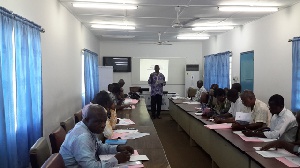The Ghana Export Promotion Authority (GEPA), has organised a two-day coaching and training programme for prospective vegetable producers, to enhance their knowledge and skills to help boost production for export.
The programme, which was attended by more than 20 farmers, exposed the participants to issues and requirements pertaining to vegetable export trade, value chain and sources of information for vegetable exports.
The training also included a day’s visit to Joekopan farms, an award winning vegetable exporter, for first-hand information on nursing, transplanting, application of pesticides and other good agricultural practices.
Addressing the opening session, Mr Stephen Normeshie, General Manager, urged the prospective vegetable exporters to pay attention to standards in the industry.
He said vegetable exports have been identified as one of the priority products to be supported in the National Export Strategy to help enhance revenue growth of non-traditional exports to $ 5 billion by the end of 2019.
Mr Normeshie said despite the sector’s potential, there are many challenges, including good agronomic practices, volumes to meet market demand, food alerts and post-harvest losses.
He said it is in this direction that GEPA is collaborating with Joekopan Limited, an award winning vegetable export company, to train and coach individuals and companies interested in going into vegetable production for exports.
Mr Normeshie said the cooperation with Joekopan is expected to increase the number of farmers producing vegetables for exports, create employment for people in the catchment areas and also enhance earnings.
He said Ghana has a potential of becoming a large exporter of vegetables and urged the prospective producers to use the right applications to meet the demands in the EU market.
Mr Peter Obeng, Director, Product Development GEPA took the farmers through the various minimum market requirements of the various vegetables as well as the documentation process.
He said as prospective vegetable farmers, there is the need to inculcate into them the ability to appreciate standards, hence the workshop.
Erasmus Ashun, Deputy Director Product Development, who spoke on Fruit and Vegetable Global Value Chain, said stakeholders need to work together to ensure that exports that enter into the European Union meet the right certification and standards.
He said this could be done through partnerships along the agricultural value chain from inputs to the growing of crops, storage, transportation, processing and marketing.
Mrs Agnes Adjei-Sam, Deputy Director, Research and Information, said trade information is an essential business tool and a must in a competitive market environment where buyers are not really waiting for the product.
She said access to the right trade information is critical for operators in the value chain since the more knowledge of the needs of prospective markets and its customers, “the more likely you would succeed”.
She, therefore, urged the producers to seek and use the right information to make them competitive
Mr Shakespeare Dzokoto, an agriculture consultant, said consumption of vegetables is on the rise opening up opportunities since market demands were never met.
He advised the prospective producers to adopt good agronomic practices to ensure that they meet the required standards for exports.
Participants expressed their appreciation to GEPA for the training and coaching programme, saying it had enhanced their knowledge and skills in good agricultural practices and more importantly the production of vegetables.
Business News of Monday, 13 April 2015
Source: GNA













